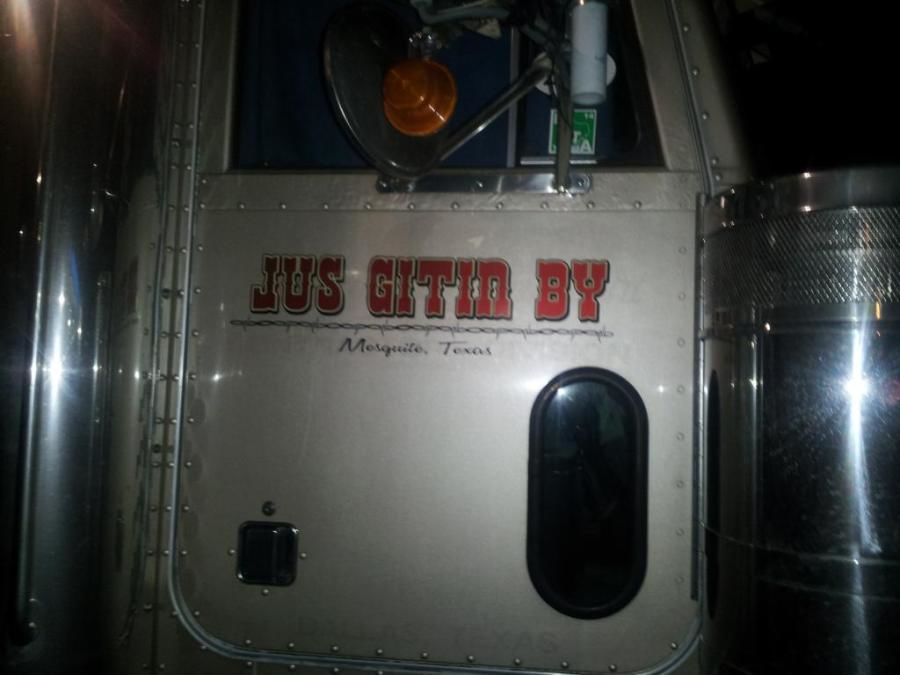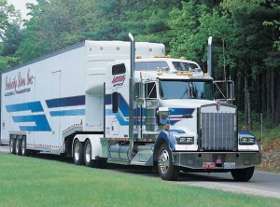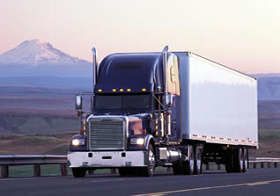Owner Operator
Topic 7654 | Page 1
The point being if I wanted to, I could take three weeks off whenever I want as opposed to requesting time off as an O/O leased to a company.
This is a great idea, but probably not for the reasons you are thinking. There will be times when it will take you three weeks to find that broker that you hooked up with just so you can wrap your hands around his throat and squeeze some of the money out of him that is owed to you.
If I lease as an owner operator with a company, essentially I am a company driver who's leasing the truck and pays more out of pocket expenses and earns a bit more.
I recently heard from a lease operator who was averaging about two hundred dollars less per week than I am as a company driver, and that is after my taxes and medical insurance are deducted. Yet he had no medical insurance, and was still going to have to pay the taxes on his earnings come tax time.
Everybody seems to be duped into thinking the only way you are going to make any money at this is by being a lease operator or an owner operator, yet I have heard so many sad stories from the folks who've tried it. The secret to success at this job is to be a productive driver who understands how to manage his time well and to be able to "roll with the punches" as it were. Be flexible, be steadfast, and be tenacious at getting it done safely and in a timely manner. Let the big boys take all the risks, and if you can prove yourself to be reliable, dependable, and productive you will reap the rewards of a better than average driver. You will have to be willing and able to run your tail off, but it will take much more than that to be a successful owner operator.
So often times the guys who aren't doing that well as a company driver are the ones who are tempted into the whole leasing trap. When someone is not making it as a company driver, they will usually find that the problems that caused them to look into leasing in the first place will end up being compounded as a lease operator. Unfortunately most drivers want to point the blame at their company or their dispatcher for the low paychecks they are receiving, when the truth is that that company desperately needs that driver to be turning those wheels. Usually if a driver's miles are low he can rectify that problem himself by doing what it takes to keep himself having available hours and making sure he gets things done without being such a problem to his dispatcher. (I'm saying these things not so pointedly at the OP but as a general guideline. The OP did not really give a reason for his interest in truck ownership)
I once met an owner operator who named his trucking business according to what was really happening on his balance sheet. Here's a shot of his truck. Think about it long and hard before you jump head long into this treacherous realm of the trucking world.

Owner Operator:
An owner-operator is a driver who either owns or leases the truck they are driving. A self-employed driver.
Dispatcher:
Dispatcher, Fleet Manager, Driver Manager
The primary person a driver communicates with at his/her company. A dispatcher can play many roles, depending on the company's structure. Dispatchers may assign freight, file requests for home time, relay messages between the driver and management, inform customer service of any delays, change appointment times, and report information to the load planners.HOS:
Hours Of Service
HOS refers to the logbook hours of service regulations.O.S. pretty much nailed it (but there's no surprise there)...
If you LEASE A TRUCK from a company - basically - you are covering THEIR EXPENSES for the equipment.
You TRUCK PAYMENT is due EVERY WEEK - whether you drive or not. Many driver that lease trucks FROM COMPANIES, get "in the hole" for their weekly expenses when they take time off - because even if you ARE NOT DRIVING - your PAYMENT IS STILL DUE.
If you "lease on" as an OWNER/OPERATOR - (that is you ALREADY OWN the equipment) - then you are not running "under your own authority" (as in - you have your own DOT/MC number, insurance, IFTA, etc.) - the you are running under the AUTHORITY OF THE COMPANY you are "leased on to". They are your operating authority and broker. You can not work, if you don't want to - but your truck payments, basic insurance (PIP/Comp) and everything else are still due.
If you decide to go "on your own" - it is a greater expense and paperwork overhead (full trucking liability insurance, IFTA and a ton of other stuff) - but you CAN do the "broker route", and take time off whenever you want (the expenses being due, still apply) - plus you have the beauty of being YOUR OWN COLLECTIONS DEPARTMENT (or have the joy of giving 5% (+/-) of your load income to a "factor" who pays you up front and then collects.
That's the "short version" of the differences between the 3 ways to lease or own.
You DEFINITELY want to spend a few years as a COMPANY DRIVER, so that you can become INTIMATELY FAMILIAR with the industry - before you decide to make ANY of these moves.
It would go like this: drive for a company (company driver) for a few years and start banking $$, getting familiar with the industry and life on the road. Then TRY a lease with a company (a walk-away lease), just so you can start to get an idea of the BUSINESS END of trucking. If you STILL want to go O/O, then purchase a tractor and lease onto a company like LandStar (or one of the companies that lease-on Owner Operators). Then, as you develop connections with brokers and shippers and you feel you can be more profitable with your own authority (and you can hack the additional expense and paperwork/regulatory overhead), go ahead and get your own Operating Authority and go out 100% on your own.
Rick
Shipper:
The customer who is shipping the freight. This is where the driver will pick up a load and then deliver it to the receiver or consignee.
Owner Operator:
An owner-operator is a driver who either owns or leases the truck they are driving. A self-employed driver.
DOT:
Department Of Transportation
A department of the federal executive branch responsible for the national highways and for railroad and airline safety. It also manages Amtrak, the national railroad system, and the Coast Guard.
State and Federal DOT Officers are responsible for commercial vehicle enforcement. "The truck police" you could call them.

Thank you for the reply. I am only curious about this but not really interested in doing anything about it. I've been a company driver for only three months and I just like to ask questions about the business and those who own and operate their own rig. I recently talked to a former O/O who decided to go back to being a company driver and he said, in his opinion, the only way to truly make significant money as an O/O is if you own two or more trucks. Otherwise, the profit margins are so thin and the amount you earn compared to a company driver isn't very impressive. I didn't go into detail about what he meant, i.e pay off one truck & buy another? two truck payments? hire a driver and have him run the other? backup truck? I don't know. I didn't have time to ask. But the more I read about O/O the more I liken it to the restaurant business. One in ten restaurants fail in their first year (although that statistic has been proven to be incorrect, it's more like 6 of 10) and the profit margins are razor thin. What about being a O/O driving local. Not as many miles, less wear and tear. I ask because I live near ports and there are always banners and signs "Hiring O/O for Port work. Must have TWIC card." Could one have a greater chance to succeed if you do local work?
TWIC:
Transportation Worker Identification Credential
Truck drivers who regularly pick up from or deliver to the shipping ports will often be required to carry a TWIC card.
Your TWIC is a tamper-resistant biometric card which acts as both your identification in secure areas, as well as an indicator of you having passed the necessary security clearance. TWIC cards are valid for five years. The issuance of TWIC cards is overseen by the Transportation Security Administration and the Department of Homeland Security.
HOS:
Hours Of Service
HOS refers to the logbook hours of service regulations.
The point being if I wanted to, I could take three weeks off whenever I want as opposed to requesting time off as an O/O leased to a company.
This is a great idea, but probably not for the reasons you are thinking. There will be times when it will take you three weeks to find that broker that you hooked up with just so you can wrap your hands around his throat and squeeze some of the money out of him that is owed to you.
If I lease as an owner operator with a company, essentially I am a company driver who's leasing the truck and pays more out of pocket expenses and earns a bit more.
I recently heard from a lease operator who was averaging about two hundred dollars less per week than I am as a company driver, and that is after my taxes and medical insurance are deducted. Yet he had no medical insurance, and was still going to have to pay the taxes on his earnings come tax time.
Everybody seems to be duped into thinking the only way you are going to make any money at this is by being a lease operator or an owner operator, yet I have heard so many sad stories from the folks who've tried it. The secret to success at this job is to be a productive driver who understands how to manage his time well and to be able to "roll with the punches" as it were. Be flexible, be steadfast, and be tenacious at getting it done safely and in a timely manner. Let the big boys take all the risks, and if you can prove yourself to be reliable, dependable, and productive you will reap the rewards of a better than average driver. You will have to be willing and able to run your tail off, but it will take much more than that to be a successful owner operator.
So often times the guys who aren't doing that well as a company driver are the ones who are tempted into the whole leasing trap. When someone is not making it as a company driver, they will usually find that the problems that caused them to look into leasing in the first place will end up being compounded as a lease operator. Unfortunately most drivers want to point the blame at their company or their dispatcher for the low paychecks they are receiving, when the truth is that that company desperately needs that driver to be turning those wheels. Usually if a driver's miles are low he can rectify that problem himself by doing what it takes to keep himself having available hours and making sure he gets things done without being such a problem to his dispatcher. (I'm saying these things not so pointedly at the OP but as a general guideline. The OP did not really give a reason for his interest in truck ownership)
I once met an owner operator who named his trucking business according to what was really happening on his balance sheet. Here's a shot of his truck. Think about it long and hard before you jump head long into this treacherous realm of the trucking world.
Yes you are right about the whole company driver not making it some what. I was a company driver who was a strong driver never late always early got my fuel bounces every week rescued at least one load per week from people who could not manage time. I always had hours available but still got the small pay checks because either i would be sitting or i would get a load pick up friday morning drop monday morning only going 300 miles. once in a awhile when i would say something like (why ? am I still here why no load) then my fleet manager would run me and I would get the miles and the pay for about 2 weeks and then end up back -where I was. So I went lease and did so much better I feel there are some fleet managers who have so many trucks to run you get lost in the system until you speek up and that gets old quick. When I complained about that 300 mile trip and when you figure out how much per hour I made it was sad and yes I complained about it on saturday when my fleet manager was in and the only answer I could get out of them was well I wasnt in yesterday so I didnt give you the load. I feel it depends on how good you are by everyone envoled fleet manager, driver, your first trainer teaching you right, planner
Owner Operator:
An owner-operator is a driver who either owns or leases the truck they are driving. A self-employed driver.
Dispatcher:
Dispatcher, Fleet Manager, Driver Manager
The primary person a driver communicates with at his/her company. A dispatcher can play many roles, depending on the company's structure. Dispatchers may assign freight, file requests for home time, relay messages between the driver and management, inform customer service of any delays, change appointment times, and report information to the load planners.Fleet Manager:
Dispatcher, Fleet Manager, Driver Manager
The primary person a driver communicates with at his/her company. A dispatcher can play many roles, depending on the company's structure. Dispatchers may assign freight, file requests for home time, relay messages between the driver and management, inform customer service of any delays, change appointment times, and report information to the load planners.HOS:
Hours Of Service
HOS refers to the logbook hours of service regulations.New Reply:
New! Check out our help videos for a better understanding of our forum features

















Preview:








 TT On Facebook
TT On Facebook
I have a question:
If I lease as an owner operator with a company, essentially I am a company driver who's leasing the truck and pays more out of pocket expenses and earns a bit more. If I'm my own authority I can connect with a broker directly and I am the trucking company. The point being if I wanted to, I could take three weeks off whenever I want as opposed to requesting time off as an O/O leased to a company.
Can I get some clarification on this? I really don't know anything about this subject so I wanted to ask.
Owner Operator:
An owner-operator is a driver who either owns or leases the truck they are driving. A self-employed driver.